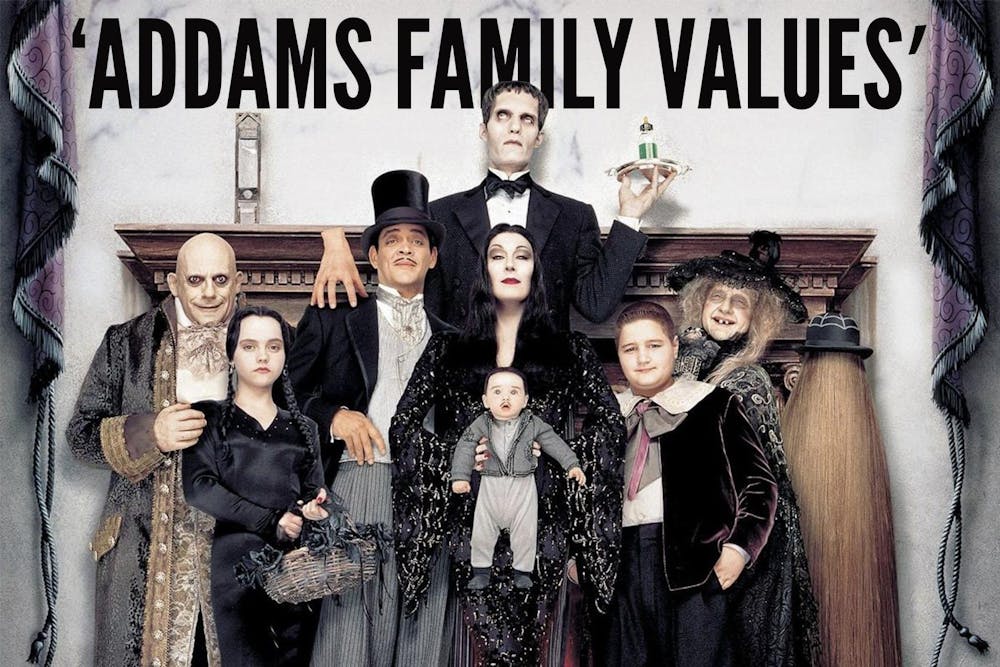Very seldom does one find a sequel stronger than the original, but 1993’s “Addams Family Values” is one of those rare exceptions. With a new season of “Wednesday” on the horizon later this year, I want to reflect on my personal favorite installment in the “Addams Family” franchise. “Addams Family Values” was directed by Barry Sonnenfeld and sees the return of Raul Julia as Gomez, Anjelica Huston as Morticia, Christopher Lloyd as Uncle Fester and Christina Ricci as Wednesday with the introduction of Carol Kane as Grandma Addams. Picking up where its predecessor ended, it features a new baby, a killer bride and the scariest setting of all … summer camp.
An often-overlooked sequel, it is often assumed that “Addams Family Values” was a mere cash grab. This is a misconception that needs to be broken! What allows “Values” to surpass the original film is that it does not need to introduce its’ crazy characters; the work has been done. Going into the film, the audience has knowledge of their personalities, allowing the Addams to be placed in situations that juxtapose their outsider nature: the first film brought the “normal” world to the Addams, while, in “Values”, the Addams are forced into the “normal” world. Furthermore, the situations presented are heavier and more mature, matching the family’s growth.
The first film followed Fester as he, suffering from memory loss, conned and tricked the family, attempting to steal their fortune. However, as he spent more time with the Addamses, he began to remember his true identity as Fester. With this growth from the first film, Fester now finds himself the victim of a similar scheme. The primary antagonist of the film is Debbie Jillensky, brilliantly played by Joan Cusack. Debbie is a black widow bride who targets wealthy bachelors, and Fester is her next target. Under the guise of a nanny for the new baby Pubert Addams, she begins to seduce and trick Fester into marrying her. Ironically, Debbie would have been a perfect fit for the family, matching their love of the macabre and obliviousness towards normal convention. The family accepts her, never wavering even when she attempts to electrocute them. The top Addams priority is family and support; Debbie is too self-absorbed and narcissistic to ever realize the true value of family. Cusack and Lloyd have fantastic onscreen chemistry which makes the dynamic even funnier. Desperately, Fester wants his relationship to be like the one Gomez and Morticia have, but he is blind to the truth about Debbie’s intentions.
My favorite subplot of the film is when Wednesday and Pugsley attend Camp Chippewa, a flawed summer camp for “privileged young adults.” As expected, the Addams children stick out from the rest of the campers and begin feuding with the counselors. As a satire, these moments are very much in the spirit of the original Charles Addams comics. The climax of this storyline is when Wednesday and the other “outcasts” sabotage the camp’s musical depicting the first Thanksgiving. Without spoilers, the scene is quintessential Addams dark humor and features incredibly satisfying comedic justice.
“Addams Family Values” is one of the most influential films for the current state of the franchise and popular conception of the characters. While at camp, Wednesday falls for a boy and begins dating, a plotline reused several years later in “The Addams Family Musical” (Nathan Lane, who originated Gomez on Broadway, plays a police officer in this film). Furthermore, the Wednesday-focus of the Chippewa scenes parallels the “Wednesday” show. When comparing the personalities of the different portrayals of Wednesday across the ‘60s show, ‘90s movies and Netflix series, Jenna Ortega’s portrayal is far more reminiscent of Ricci than Lisa Loring (who played Wednesday in the original 1960s sitcom, “The Addams Family”). Unlike the original sitcom, Lurch, the monster butler, does not speak words in the films. This characteristic has become the norm for subsequent portrayals of the character in recent “Addams” media.
“Addams Family Values” should be remembered alongside films like “Goldfinger,” “Christmas Vacation” and “The Dark Knight” as a sequel that surpasses its predecessor. If you are in the mood for a good laugh but also something “all together ooky”, this film is perfect — or dreadfully imperfect — for you.










